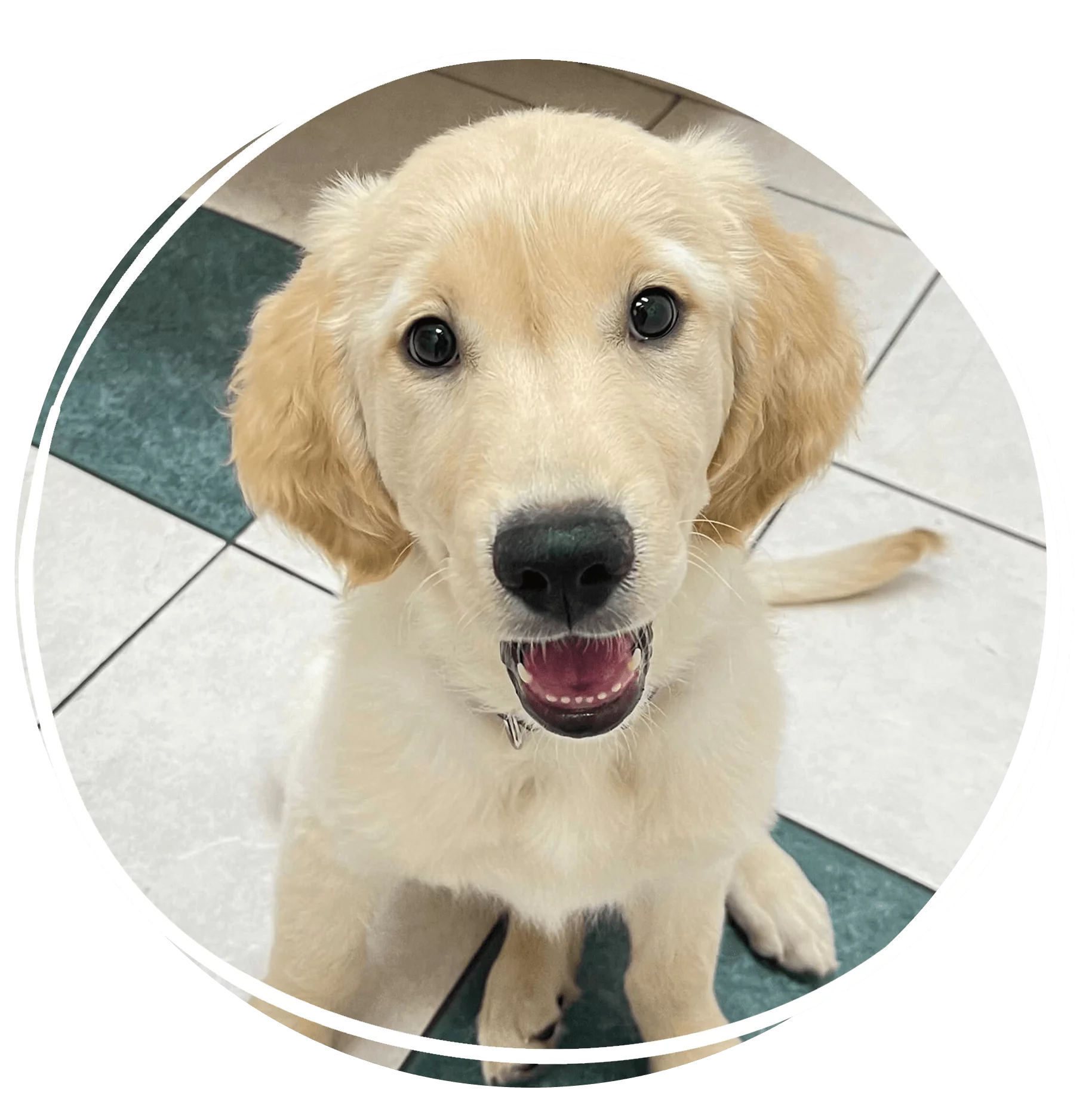
Our Veterinary Blog
Dog Constipation: What to Do If Your Dog Can’t Poop
When your dog is struggling to go potty, it is only natural that you want to find some way to help them. Not being capable of passing stool can be very uncomfortable for your pup.
There are various ways you can help your dog if they are constipated. Pumpkin is a good option for pups who are having trouble defecating. Many human foods contain bulk-forming fiber and are safe for your dog to eat.
Laxatives should only be considered as a last resort for your dog and only under the guidance of your veterinarian. If you want to learn more about dog constipation and what to do if your dog can’t poop, check out this article.

What is Constipation?
Dogs, like humans, may have trouble producing a successful bowel movement from time to time. However, if your pup has a problem defecating for an extended time, there may be a health issue that needs to be addressed. Constipation is not fun for anyone.
Constipation is when waste is sluggish to move through the gut, or the waste becomes blocked inside the digestive tract and does not seem to be able to come out. If your dog is constipated, they may be straining to defecate, and small, rock-hard stool may result.
If your pup has not had a bowel movement in two to three days, it means that they are constipated and should be taken to the vet. Sometimes constipation can be mild and resolve quickly on its own. Still, if your dog has been exhibiting poor digestive issues, such as struggling to defecate, you may want to take them for an examination to be safe.
What Are the Symptoms of Dog Constipation?
You can tell if your dog is constipated by walking them to go potty and observing their behavior. If your pup is having difficulty with passing stool, there are some key issues to watch out for:
- Rock hard stool
- Decreased or no bowel movements
- Taking longer than usual to go potty
- Blood in stool
- Vomiting
- Lack of appetite
- Lack of energy
- Distended or swollen belly
- Abdominal pain
Your dog may also pace back and forth in anticipation, but nothing comes out. They may also lick at their belly frequently.
What is Treatment for Dog Constipation?
There are many different approaches to treating constipation in dogs. In severe cases, surgery may be required to restore regular bowel movements. If the constipation is not yet severe, it may only take changes in your pup’s diet to help them go potty. The following include some possible solutions for your dog’s constipation:
Plain Canned Pumpkin
Canned pumpkin is an excellent source of fiber that can help with constipation. Pumpkin is also a great prebiotic, as it supports the presence of good bacteria in the gut. Pumpkin is also packed with vitamins and nutrients:
- Iron
- Lutein
- Calcium
- Vitamin C
- Vitamin A
- Vitamin E
- Beta carotene
Make sure you are giving your dog plain canned pumpkin, not pumpkin pie filling, as the ingredients in the filling can make your pup sick. Since pumpkin is high in fiber, it will help your pup stay fuller. The canned pumpkin moisture will help loosen your dog’s stool.
When the pumpkin is being used to help treat constipation in dogs, it is suggested that dogs should get one tablespoon for every ten pounds up to two times daily. For example, a thirty-pound dog would get three tablespoons up to two times a day.
Exercise
Get your dog moving! Take your pup for a walk to get their blood circulating and the juices flowing. Exercise helps stimulate movement within the gastrointestinal tract. If a walk does not do it, take them to the dog park and play a spirited game of catch with them. It is healthy for their bodies and may help push stool right through their colon, and they will go potty.
Canned Food and Water
If your dog usually eats dry food, have them try canned food for a change. Wet food contains moisture, which can help with digestion and may increase the likelihood of your pup passing stool. Dry food may not be ideal for your dog’s digestive health and switching to canned food may do the trick.
If your pup loves dry food, try switching to wet food for two days. Then you can give them back the dry food they are used to. Water will also provide the moisture they need to go potty. If your pup’s stool is hard and small, it may indicate that they are dehydrated.
Flaxseed
Flaxseed is an excellent source of omega-three and omega-6 fatty acids. The anti-inflammatory properties of flaxseed can help:
- Ease arthritis
- Helps with treating kidney and heart disease
- Improve kidney function
- Lower blood pressure
- Promote healthy skin and coat
- Reduces susceptibility to intestinal parasites
Flaxseed can also help your dog’s digestive system and intestinal health. If you want to try to give your pup flaxseed, you can add a little to their regular food, mix it with peanut butter, or sprinkle a bit onto some plain Greek yogurt.
The Fiber in Certain Foods
Dogs can have certain human foods that can help relieve constipation:
- Apples (seeds are toxic)
- Bananas
- Blueberries
- Cantaloupe
- Peaches
- Strawberries
- Broccoli
- Carrots
- Green beans
- Spinach
- Sweet potatoes
- Kale
Some fruits and vegetables can benefit your dog and help them go potty. Dogs can also safely eat plain, unflavored oatmeal, which is also high in fiber.
Apple Cider Vinegar
You can use a minimal amount of apple cider vinegar to help alleviate your dog’s constipation. Pups who are supplemented with apple cider vinegar may experience:
- Healthier coat
- Reduced allergies
- Decreased inflammation
- Balance of pH
- Healthier immune system
- Improved gastrointestinal system
The prebiotic qualities of apple cider vinegar can help your dog with constipation. However, only give your pup a very small dose, as it could lead to more stomach irritation if a more significant amount is ingested.
Probiotics
If your dog experiences constipation regularly, probiotics may be a viable option. There are some probiotics you can get that are specifically for dogs. They help encourage healthy bacteria in the gut, which assists with the digestion of food. Make sure you do not give your pup human probiotics, as they may harm your pup.
Laxatives
In more serious cases, you can consult with your vet regarding laxatives, such as docusate sodium, to help them go potty. It will help your pup’s intestines absorb more water, which can help support their gastrointestinal system.
Conclusion
When your dog is constipated, try helping them the natural way first. If you have tried everything and they are still not able to produce normal stool, you should take them to the vet. Laxatives can be helpful, but only under your veterinarian’s supervision.
At Lakeland Animal Clinic, our doctors are dedicated to caring for all your pet’s needs! If you have any questions or would like to schedule an appointment, give us a call at (863) 688-3338.
Recent Posts
About Us
Family is family, whether it has two legs or four. At Lakeland Animal Clinic, we've spent the last 40 years healing and caring for your pets. As a family-operated practice, we know that family is about more than simply being related. Animals give us the ability to develop strong bonds and feel great compassion for a fellow living creature.
